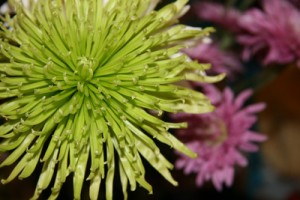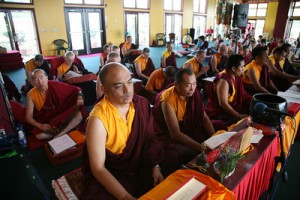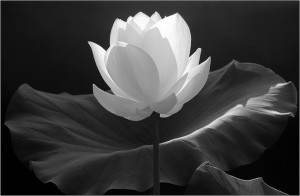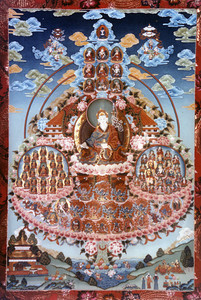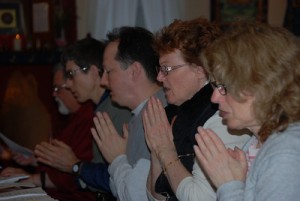An excerpt from the Mindfulness workshop given by Jetsunma Ahkon Lhamo in 1999
Since you were young and you figured out that it was very bad to get caught, that idea has never changed. Literally, once that idea is there, it’s in you. You have that idea. Why go back and challenge it? Because it isn’t true. We have to overcome that childish, immature part of us that we have preserved. You’re not only in trouble when you get caught; you’re in trouble when you’re in a state of non-recognition. You’re in trouble when you’re asleep, spiritually speaking. So why are we thinking in that same childish way? Because it is also human nature, and we have to observe this about ourselves, that in certain ways, we’re incredibly lazy.
We like to keep really busy to reach a goal because we want that, but when it comes to backtracking and reevaluating an old conceptual scenario, like “it’s only trouble when you get caught,” we’re not going to do that unless we are pushed to do it. We’re not going to do that because we already did it. Why do it again?
In order to practice effectively, you must go back and challenge all things samsaric, all conceptual proliferation. Instead of going through the rest of our lives in a childlike way, we have to go back and reevaluate, and you know how childlike we are about this. We don’t want to get caught. We don’t want to get in trouble. We don’t want people to think badly of us, so we work very hard at this. Instead of staying in that childish place, which only reinforces the idea of self-nature as inherently real, ego-cherishing, ego-clinging and the division between self and other, why not go back and challenge appearances? Why not go back and reevaluate and ask yourself: what is the nature of suffering? Where does the suffering come from? Does it come from getting caught?
If you are gifted with the ability to impress people with how cool and attractive and wonderful you are, and yet within your mind, you’re basically a schmuck, constantly in judgment of others, constantly uncaring about others, constantly in a state of non-recognition, constantly fearful, angry, not compassionate, just your average, ordinary, mid-grade schmuckness on the inside but on the outside it’s not visible, then you have the greatest obstacle of all. I am so sorry for you. I’ll do anything I can to help you work through that, but it’s not going to work unless you work through it with me. It’s much easier to be a student if you’re somebody like a recovering alcoholic and know that people have seen you vomit. You have gotten to the bottom and it was nasty and dirty and there was no way you could avoid it. I have more hope for the practitioner that one day decided to practice because they woke up in a pool of their own vomit than I do the practitioner that wants to practice because they want to be a Buddhist. You think about that. To come to the point where you really deal with yourself, with the appearances that you are putting forth, and discriminate between that, and just faking your way through. This is really quite a different level of depth, isn’t it?
You have to ask yourself: remaining in a state of non-recognition, acting outwardly as though you have some answers, what do you think the result will be? Why wait for me to tell you? What do you think the result will be? Assuming that the seed and the fruit are the same, that the seed produces the appropriate fruit and not a different kind of fruit, what do you think is going to happen? Do you think your life will have less suffering in it, or more? So much more. But to be in a state where you’ve seen that there is some flaw here, that there’s something wrong here, then there is a kind of self-honesty that you have attained. In the case of the recovering alcoholic, maybe you come to the point where you say, “Well, anywhere I go from here is up,” that is a very valuable point because at that point you’re not faking it. You’re not in a place where you’re saying, “Oh, if I act this way, then I’ll be this way.” Having fallen so far to where you’ve bottomed out and really recognize the faults of samsara, when you begin to engage mindfulness, it won’t be an external acting. It will be more of an internal engagement, or an internal awareness.
It’s that kind of thoughtfulness, mindfulness, and recognition that must be part of our practice. If we had been born in a culture where spiritual progression and realization were not only valued but eventually expected, we wouldn’t have to be told this, just as in a materialistic society we don’t have to be told that you have to train for your profession. We would automatically, by reading these texts, understand that it is pointless to read the prayers, even if you read them so well and you are so cool when you read them. If you have no understanding of their meaning or if you are insincere about this recitation, there’s just no point. To realize that the point is to actually awaken, to move into a state of recognition, one would practice differently than if one’s understanding was that you had to do a certain amount of practice in order to be a really cool guy, or in order to be successful at Buddhism. Do you see the difference? One is about mind training, and the other is about samsara.
© Jetsunma Ahkön Lhamo

